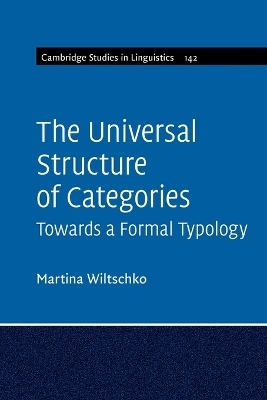
The Universal Structure of Categories
Seiten
2022
Cambridge University Press (Verlag)
978-1-009-34245-2 (ISBN)
Cambridge University Press (Verlag)
978-1-009-34245-2 (ISBN)
Using data from a variety of languages, this book explores a range of grammatical categories and constructions, including tense, aspect, subjunctive, case and demonstratives. It presents a new theory of grammatical categories - the Universal Spine Hypothesis - and reinforces generative notions of Universal Grammar while accommodating insights from linguistic typology.
Using data from a variety of languages such as Blackfoot, Halkomelem, and Upper Austrian German, this book explores a range of grammatical categories and constructions, including tense, aspect, subjunctive, case and demonstratives. It presents a new theory of grammatical categories - the Universal Spine Hypothesis - and reinforces generative notions of Universal Grammar while accommodating insights from linguistic typology. In essence, this new theory shows that language-specific categories are built from a small set of universal categories and language-specific units of language. Throughout the book the Universal Spine Hypothesis is compared to two alternative theories - the Universal Base Hypothesis and the No Base Hypothesis. This valuable addition to the field will be welcomed by graduate students and researchers in linguistics.
Using data from a variety of languages such as Blackfoot, Halkomelem, and Upper Austrian German, this book explores a range of grammatical categories and constructions, including tense, aspect, subjunctive, case and demonstratives. It presents a new theory of grammatical categories - the Universal Spine Hypothesis - and reinforces generative notions of Universal Grammar while accommodating insights from linguistic typology. In essence, this new theory shows that language-specific categories are built from a small set of universal categories and language-specific units of language. Throughout the book the Universal Spine Hypothesis is compared to two alternative theories - the Universal Base Hypothesis and the No Base Hypothesis. This valuable addition to the field will be welcomed by graduate students and researchers in linguistics.
Martina Wiltschko is an Associate Professor in the Department of Linguistics at the University of British Columbia.
1. The universal structure of categories; 2. A history of ideas behind the spine; 3. The universal spine as a heuristic for the identification of grammatical categories; 4. Anchoring categories in independent clauses; 5. Anchoring categories in dependent clauses; 6. Nominal anchoring categories; 7. Categories that introduce a point of view; 8. Towards a formal typology.
| Erscheinungsdatum | 07.12.2022 |
|---|---|
| Reihe/Serie | Cambridge Studies in Linguistics |
| Zusatzinfo | 47 Tables, black and white; 2 Halftones, black and white; 18 Line drawings, black and white |
| Verlagsort | Cambridge |
| Sprache | englisch |
| Maße | 152 x 229 mm |
| Gewicht | 546 g |
| Themenwelt | Geisteswissenschaften ► Philosophie ► Sprachphilosophie |
| Geisteswissenschaften ► Sprach- / Literaturwissenschaft ► Sprachwissenschaft | |
| ISBN-10 | 1-009-34245-2 / 1009342452 |
| ISBN-13 | 978-1-009-34245-2 / 9781009342452 |
| Zustand | Neuware |
| Haben Sie eine Frage zum Produkt? |
Mehr entdecken
aus dem Bereich
aus dem Bereich
Aspekte einer Ontologie des Logos
Buch | Hardcover (2024)
Springer Fachmedien (Verlag)
CHF 167,95
Wie die Menschheit zu ihrer größten Erfindung kam
Buch | Softcover (2022)
C.H.Beck (Verlag)
CHF 25,20
Macht und Legitimität politischer Sprache im Prozess der europäischen …
Buch | Softcover (2023)
Nomos (Verlag)
CHF 103,60


